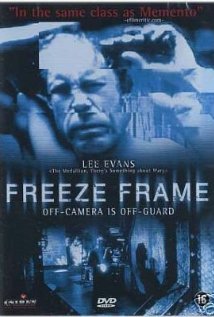Starring: Lee Evans, Rachael Stirling Directed by: John Simpson
Freeze Frame is the story of a man accused, wrongfully, he contends, of a triple murder. The case is dismissed due to lack of evidence, so the accused, Sean Veil, does what any rational person would do. He starts to tape himself 24 hours a day to assure if he is ever again accused of such a crime, he will have the evidence with which to exonerate himself.
He has cameras in his bedroom, his foyer, outside his door, cameras in the room where he monitors the cameras, even cameras in the loo. When he leaves the house he straps a giant camera to his chest. Questions like, “What in the hell does he do when he goes to work?” aren’t really bothered with.
Eventually Detective Louis Emeric and Forensic Profiler Saul Seger, the duo responsible for accusing Veil of the original crime, make another appearance at Veil’s house. They want to know where he was on a specific date in the middle of October five years ago. They have found a dead body and believe Veil to be the culprit yet again.
Lucky for Veil, he keeps tapes of all day every day in a giant vault, all he will have to do is retrieve the night in question. But, lo and behold, when he goes to collect them the night in question has disappeared. Veil escapes the police through a trap door and spends the rest of the film trying to clear his name.
Lee Evans does a fantastic job as Veil, a neurotic, tightly wound paranoid who keeps you guessing about his innocence until the final frame. The direction is solid, and nicely balances a mix of film and “documented” footage.
 That’s about where the niceties of this particular film end. The supporting cast are mostly a mediocre lot, although I’m unsure how much is their fault and how much is poor scripting. The main portion of the plot, Veil’s 24-hour surveillance of himself, which seems engaging and original, quickly turns in to more of an afterthought. It starts as a way to examine the psyche of our (anti?) hero, only to quickly devolve into a vehicle by which the characters in the film can explain things they would never usually have any way to explain.
That’s about where the niceties of this particular film end. The supporting cast are mostly a mediocre lot, although I’m unsure how much is their fault and how much is poor scripting. The main portion of the plot, Veil’s 24-hour surveillance of himself, which seems engaging and original, quickly turns in to more of an afterthought. It starts as a way to examine the psyche of our (anti?) hero, only to quickly devolve into a vehicle by which the characters in the film can explain things they would never usually have any way to explain.
The plot spends so much time focusing on Veil and so little time focusing on either of the crimes that, by the time it comes to reveal whodunit, the filmmakers have to resort to one of the worst story devices in order to clarify the convoluted plot: Just have somebody sit down and explain it for no apparent reason.
I was pretty engrossed in this film for the better part of an hour, despite some plotting that seemed a little forced. Then, when the final act comes , the explanation is illogical, the acting is wooden, and the dialogue is forced and stilted, but mostly because it was written that way and not because the actors aren’t trying their damndest. It is most unfortunate as an intriguing premise and a great lead performance are wasted.
Written by Ryan Venson
